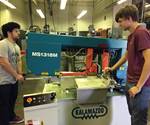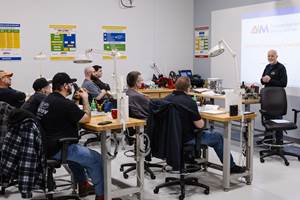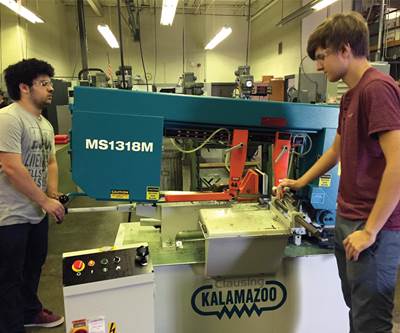Strengthening Manufacturing through Advocacy
Trade organizations are providing the guidance and resources needed to prepare students and women for careers in advanced manufacturing.
With a growing number of employees nearing retirement, workforce development continues to be a central issue for manufacturing business owners and managers. Some companies are opting for membership in trade organizations such as the Technology and Manufacturing Association (TMA), local chapters of the American Mold Builders Association (AMBA) and the Canadian Association of Mold Makers (CAMM). These organizations are inspiring examples of how trade-related programs, education, events and other resources help shine a light on today’s moldmaking industry and the potentially rewarding careers available.
Guiding Manufacturing Curriculum
The TMA’s Education Foundation is dedicated to promoting manufacturing careers and advancing existing manufacturing training programs that contribute to much-needed workforce development in skilled trades including machining and moldmaking. It also provides both financial and practical resources for schools looking to develop relevant programs that will set students on pathways to viable manufacturing careers. One such school is Lake Park High School in Roselle, Illinois, which is in the second full year of its new machining program. While the school has offered an industrial technology program for some time, its focus was on woodworking, automotive, graphic arts and electronics. But, according to Kevin Jones, curriculum leader for career, technical and fine arts education, it became clear that the program needed to be expanded when members of the business community began requesting that a machining program be developed. “They needed young, skilled employees who could eventually replace their aging employees, and they told our administrators they needed them sooner than later.”
Jones says the TMA helped Lake Park establish an advisory council by putting the call out to its membership. Today, the council is made up of representatives from about 30 manufacturing enterprises in the local area, as well as the TMA. “We held our first meeting of the council in May 2013, and the momentum took off,” he says. Over the course of the next year, the council met monthly to discuss what types of programs the school would offer, and for the 2015-16 school year, level one of a new Engineering and Precision Machining Technology class was offered, which focuses on operation of manual mills and lathes. More than 60 students enrolled. The following year, level two of the program was launched, introducing students to CNC equipment operation. To further strengthen the program, Jones says the advisory council suggested that both program instructors take the Introductory Hands-On CNC training offered by the TMA. They attended the 16-week course, which combined theory and hands-on training in the setup, operation and programming of CNC mills and lathes, earning National Institute for Metalworking Skills (NIMS) credentials for both.
Concurrent with the high school launching its new machining program was the introduction of three “Project Lead the Way” courses, including Introduction to Engineering Design, Principles of Engineering and Computerized Integrated Manufacturing. By the end of the 2015-16 school year, more than 290 students had enrolled in the new industrial machining program. Realizing that the high school did not have the capacity to house these new programs, a new Innovation Center was added, with the advisory council providing valuable input about the design and layout of the new facility, Jones says. It features a 26-station computer lab/classroom; a large production area for manual and CNC machines; a storage area/toolroom; and safety features, such as power shutoffs on each wall, an eyewash station and more.
A $50,000 grant from the TMA’s Education Foundation enabled Lake Park to purchase equipment needed for the program, including a Haas Mini Mill VMC with a 10-tool toolchanger. “In the past year, members of the advisory council have donated cash, equipment and tooling in excess of $100,000,” says Ian Smith, the school’s assistant principal. “We were recently awarded a second, $39,000 grant from the TMA Education Foundation to help purchase another Haas Mini Mill, toolchanger and accessories this year. Other lab equipment includes two Haas TL1 lathes, fully enclosed, with quick-change toolholders; four Bridgeport manual mills; four Sharp manual lathes, each with three-jaw, four-jaw and 5C collet holders set up with quick-change toolholders, plus a Mitsui surface grinder; a Jet horizontal band saw; a pedestal grinder; and two LED TVs for demonstration and instruction purposes. Most recently, we received a $12,725 donation from our AC members to purchase an Epilog Zing laser engraver.”
As part of the training program at Lake Park, students have worked internships at local manufacturing companies Avanti Engineering Inc. and Robert C. Weisheit Co. “We are currently working with mold manufacturers Pro-Mold & Die and Matrix Tooling Inc. to provide more opportunities for job shadowing and internships for moldmaking,” Jones says.
“The advisory council continues to meet every other month to discuss programs, equipment, training and careers in the manufacturing area,” Smith says. “The advisory council gave guidance in the development of our academic program as well as our facility needs. Beyond the curriculum, the TMA Education Foundation grants have provided significant seed money to help our district offset the cost of some of our equipment. I cannot express enough just how grateful we are for their assistance with our program.”
Marketing Careers in Moldmaking
During a dinner meeting in 2012, a video was shared with members of the AMBA Chicago Chapter that would impact the course of that chapter’s work. “I remember the emotional reactions we all experienced as we learned how the faculty at Eleva-Strum High School (Strum, Wisconsin) developed a vocational manufacturing curriculum that then led to the school actually establishing a real, student-run manufacturing company called Cardinal Manufacturing,” says Francine Petrucci, president of Aurora, Illinois-based BA Die Mold Inc. and immediate past chair of the AMBA chapter. “It was like a fire was lit underneath us and we had to do something about it.”
She says the video, which was produced by Creative Technology Corp., so affected members that, by the end of the evening, an education committee was formed. Since that time, the committee has been actively promoting advanced manufacturing careers using various marketing strategies. With some initial seed money provided by the chapter’s board of directors and later using funds from two $5,000 grants won as AMBA Chapter of the Year in 2015 and 2016, the committee, with assistance from Creative Technology, established its own website (moldyourcareer.org); adopted the telltale slogan “Earn While You Learn;” and developed a brochure featuring career-path options for budding moldmakers, designers and machinists, including education requirements, salary potential versus other, nonmanufacturing career options, and other useful information geared to both students and their parents, teachers and counselors.
“Fortunately for us, one of our active committee members is a long-time veteran of moldmaking and a noted instructor in the Chicago area, Joe Genc,” Petrucci says. “We were able to post the Moldmaking 302 course syllabuses that Joe created for the TMA, where he is an instructor, on our website, which provides an excellent overview of the trade, the training, course descriptions and overall performance expectations of apprentices.”
The materials are distributed at area high school and community college career and job fairs, with members volunteering their time and their apprentices’ time to staff tabletops and booths. “No one hesitated when it was proposed that our apprentices become actively involved at events, as able,” Petrucci says. “These ‘student advocates,’ as we call them, relate best with the young people and were particularly successful with engaging the hundreds of students that visited our booth in the Smartforce Student Summit at IMTS 2014.” Time was short and expectations were high, she says, when Chicago AMBA learned there was a booth available at IMTS that year. “We mobilized the committee and every member faithfully executed his or her tasks, including having banners made, providing an injection mold to display with parts molded from it and a video showing it in action; plus, we had many other molded parts on display that were components for products the students could relate to. Apprentices staffed the booth with their bosses every day during that week-long event.”
Petrucci says the experience helped the education committee connect with schools it would otherwise never have communicated with, triggering new ideas for how to reach even more educators and counselors. For example, in 2015, the Chicago chapter accelerated its efforts by hosting its first supplier night fundraiser, which Petrucci says garnered enthusiastic support from more than 35 exhibiting suppliers. Funds raised were earmarked for yet another new marketing initiative, an annual Careers in Advanced Manufacturing Educators’ Symposium. At the symposium, more than 40 superintendents, teachers and school counselors were invited to learn about rewarding careers in mold manufacturing. Roundtable discussions were led by AMBA members, their apprentices, manufacturing instructors and others to provide attendees with more in-depth and personal perspectives about mold manufacturing, the demand for highly skilled workers, the earnings potential and more. The superintendent from Leyden High School District 212 (which has a successful manufacturing program) spoke and reinforced the importance of schools-based manufacturing programs and described Leyden’s success in building relationships with area businesses, such as A-1 Tool Corp., which participates on its advisory board. In 2016, an additional educators’ symposium was held at Industrial Molds Group in outlying Rockford, Illinois, to bring its message to another region where manufacturers are in need of an influx of new, promising talent.
The AMBA’s Chicago chapter continues to cultivate new ways to promote moldmaking and related advanced manufacturing career opportunities, including participating at Manufacturing Day events hosted by machine tool suppliers such as Toshiba and GF Machining Solutions. It has shared its successes with other AMBA chapters that want to duplicate its programs. “Our board and its members believe that, in order to grow the industry and create stronger chapters within the AMBA, we have to work together,” Petrucci says.
Connecting Women with Manufacturing
The Canadian Association of Mold Makers represents more than 50 mold manufacturing companies and 60 mold industry supplier companies. Jonathon Azzopardi, CAMM’s current chairman and president of Tecumseh, Ontario-based moldmaker Laval International, says the skilled worker shortage is a challenge that still resonates in the region. “There are still many skilled manufacturing positions to fill in Windsor, and we believe women are the answer. CAMM is working to introduce women to careers in moldmaking through our partnership with WEST,” he says.
WEST is Women’s Enterprise Skills Training of Windsor Inc., a non-profit organization that has operated in the Windsor-Essex region since 1987 and caters to women facing significant barriers to employment opportunities. Azzopardi says CAMM members help WEST organize events, develop relevant curriculum, provide plant tours and connect women with potential employers as part of the industry council organized by WEST, and the benefits are mutual. “WEST graduates help to fill the open positions on CAMM members’ shop floors,” he says.
In partnership with St. Clair College, an Ontario-based college offering degrees and graduate certificates in advanced manufacturing, WEST launched the Women in Skilled Trades and Information Technology (WIST) program in 2014 with a pre-apprenticeship training program, which includes skills enhancement classes and job placements with local employers such as CAMM member companies. “The pre-apprenticeship curriculum is designed by manufacturers around the needs of the industry, and focuses on various aspects of related manufacturing processes such as CNC, electrical, pneumatics, hydraulics and mechanical,” Azzopardi says. “This enables women to be more valuable employees from the start.”
Rose Anguiano Hurst, executive director of WEST, says WIST comprises a combination of classroom instruction, workshops and practical labs that teach employability skills and workplace culture. Workshops are led by women who already work in the traditionally male-dominated trades and are designed to build confidence and offer insight into the manufacturing industry. “We assume too easily that no barriers exist for women, but this is not reality,” Azzopardi explains. “Together, CAMM and WEST work to prepare both the candidate and the potential employer for the employment phase. Each situation is unique and CAMM provides necessary support and education for a successful landing in these companies.”
In addition, CAMM is also involved with Build a Dream, an annual, day-long event established in 2012 and hosted by several Windsor-based organizations, including Workforce Windsor-Essex, St. Clair College, WEST and the University of Windsor’s engineering faculty. Nour Hachem-Fawaz, employer relations and co-op coordinator for the University of Windsor’s Co-op, Career and Employment Services department, explains that the event is aimed at educating parents and their daughters about career opportunities in manufacturing and other sectors that are significantly under-represented by women. “This event was created after a study we conducted showed that parents were the No. 1 influence when it came to career decisions,” she says.
A career fair is a featured part of the event, and both Laval International and Cavalier Tool and Mold, also a CAMM member company, are among those that have been vocal about increasing the number of women pursuing the trades. Both companies sponsored Build a Dream, contributing to the planning and materials development, participating in panel discussions, and also attending the career fair to talk with parents and young women who attended the event, Azzopardi says.
“History has a way of repeating itself,” Azzopardi says. “Women were the key to the manufacturing industry that helped fuel the North American supply chain during World War II. We seem to forget the important roles women have played in supporting manufacturing on both sides of the border. It’s way past time to give them a second look.”
Related Content
Making Mentoring Work | MMT Chat Part 2
Three of the TK Mold and Engineering team in Romeo, Michigan join me for Part 2 of this MMT Chat on mentorship by sharing how the AMBA’s Meet a Mentor Program works, lessons learned (and applied) and the way your shop can join this effort.
Read MoreMold Maintenance Continues to Matter: Enhanced Training Program in a New Facility
I attended a MoldTrax mold maintenance workshop in 2019 and shared my experiences, and despite changes in ownership, the workshop's remarkable value endures, as discussed in a recent Q&A with the current leadership.
Read MoreMMT Chats: The Science of Moldmaking, Part 2
In Part 2 of this two-part MMT Chat, Christina and Don continue their conversation by exploring lean manufacturing and tips on how to attract, train and retain the future workforce.
Read MoreHow to Improve Your Current Efficiency Rate
An alternative approach to taking on more EDM-intensive work when technology and personnel investment is not an option.
Read MoreRead Next
Getting Real about Manufacturing Education
Some education programs are using real-world projects and engaging industry to better equip students with viable skills for careers in advanced manufacturing.
Read MoreHow to Use Strategic Planning Tools, Data to Manage the Human Side of Business
Q&A with Marion Wells, MMT EAB member and founder of Human Asset Management.
Read MoreAre You a Moldmaker Considering 3D Printing? Consider the 3D Printing Workshop at NPE2024
Presentations will cover 3D printing for mold tooling, material innovation, product development, bridge production and full-scale, high-volume additive manufacturing.
Read More
























